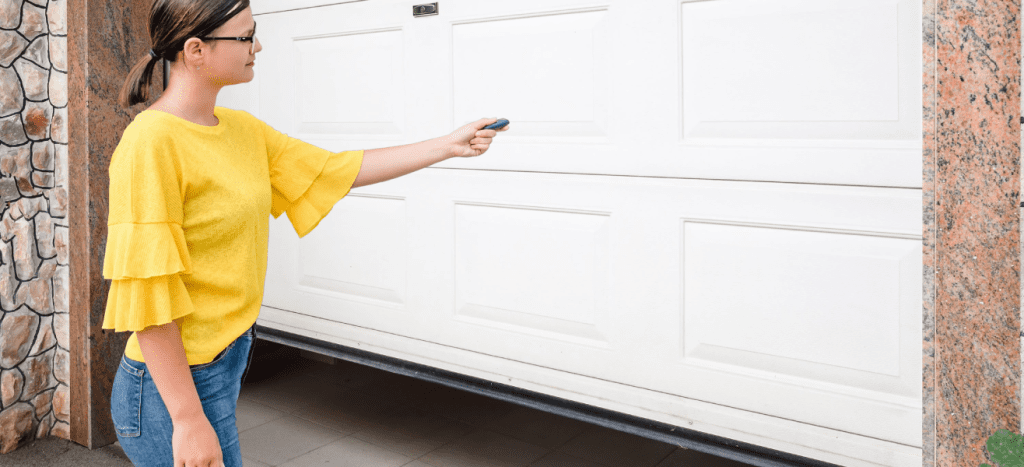Picture this: you’re rushing out the door to work or coming home after a long day, and your garage door refuses to budge. A malfunctioning garage door isn’t just an inconvenience—it can disrupt your day and compromise your home’s security. For homeowners, a reliable garage door is essential for both convenience and safety. It provides easy access to your home, secures your belongings, and even adds to your property’s curb appeal.
Understanding why your garage door might not be operating correctly is the first step to maintaining it in top shape. In this blog post, we’ll explore the common reasons that might cause your garage door to become stubbornly immobile. You’ll learn practical DIY troubleshooting tips to address these issues. And most importantly, you’ll discover when it’s time to call in the professionals to ensure your garage door is safe and functioning as it should.
Common Reasons for a Garage Door Not Opening or Closing
here are the most 7 Reasons Your Garage Door Isn’t Closing according to the experts at Pro Entry Garage Doors
Lack of Maintenance
Regular maintenance is crucial for keeping your garage door in top-notch condition. Over time, dirt and debris can accumulate in the tracks, rollers, and hinges, causing friction and preventing smooth operation. Without proper lubrication, the parts may wear out faster, leading to more significant problems. Regular inspections can prevent small issues from turning into costly repairs.
Another aspect of maintenance often overlooked is checking the alignment of the door. If the door is off-balance, it can strain the opener, making it harder for the door to move. This imbalance can also cause uneven wear on the components, further increasing the risk of malfunction. By maintaining your garage door, you can ensure its longevity and reliability.
Lastly, don’t forget about the weather sealant. It not only keeps out the elements but also plays a role in the door’s overall operation. Cracked or worn-out sealants can lead to misalignment or gaps, making it harder for the door to close properly.
Sensor Issues
Garage doors today come with safety sensors located near the floor on each side of the door. These sensors play a critical role in preventing accidents. However, if they become misaligned or obstructed, they can prevent the door from closing. Dust, dirt, or objects blocking the sensors can trick the system into thinking there’s an obstruction in the door’s path.
To identify sensor problems, look for blinking lights. This indicates a disruption in the signal between the sensors. A simple cleaning with a soft cloth can often resolve the issue. Ensure the sensors are correctly aligned and facing each other. A small adjustment might be all it takes to get your door working again.
In some cases, damaged wiring can also affect the sensors. Inspect the wires for any signs of wear or disconnection. If you notice any issues, replacing the wiring might be necessary to restore functionality.
Broken Springs or Cables
The springs and cables of a garage door bear much of its weight, enabling easy operation. Over time, these components can wear out or break, making it impossible for the door to open or close properly. You might hear unusual noises or notice a lack of tension in the door when springs or cables are compromised.
Broken springs are particularly hazardous, as they can cause the door to slam shut unexpectedly. This poses a safety risk to both people and property. Similarly, frayed or snapped cables can make the door unstable and prone to jamming.
Replacing springs or cables requires professional expertise, as improper handling can lead to injury or further damage. Regular inspections can help identify wear and tear before these components fail completely.
Power Source Problems
A simple yet often overlooked issue is the power source. A garage door that won’t open or close might just be suffering from a lack of power. Check to ensure that the unit is plugged in and that the circuit breaker hasn’t tripped. Power surges or outages can disrupt the door’s operation, so resetting the system may be necessary.
Remote controls and wall-mounted switches are also part of the power equation. Replace the batteries in the remote and ensure that the switch is functioning correctly. Faulty wiring or loose connections can also prevent the door from responding to commands.
If your garage door opener has a backup battery, check that it’s charged and functioning. This feature is handy during power outages and ensures the door remains operational even when electricity is unavailable.
DIY Troubleshooting TipsCheck the Power Source
Before jumping to conclusions, always start by checking the power source. Verify that the opener is securely plugged into a working outlet. If your opener operates via a circuit breaker, ensure it hasn’t been tripped or switched off accidentally. Often, a simple reset of the breaker can resolve the issue.
If you rely on a remote, replace its batteries and test its functionality. Sometimes, the remote may lose its programming, so reprogramming it according to the manufacturer’s instructions can help. Ensure the wall control is also operational, as malfunctioning controls can disrupt the entire system.
For units with a backup battery, check the battery’s health and replace it if needed. Regularly testing your opener’s power source can save time and prevent unnecessary frustration.
Inspect and Clean the Sensors
Sensors are crucial for the safe operation of your garage door. Begin by inspecting the sensors located on either side of the door, near the floor. Ensure they are clean and free from obstructions. Wipe them gently with a soft, damp cloth to remove dust and debris that may interfere with their function.
Align the sensors to face each other directly. Misalignment can cause the sensors to miscommunicate, preventing the door from closing. Most sensors have indicator lights that show their status—solid lights mean they are working correctly. If you notice blinking or no lights, recheck the alignment and clean them again.
Sometimes, even after cleaning, the sensors may not function properly due to wiring issues. Examine the wires for damage, ensuring they are securely connected. Addressing sensor issues promptly can restore your garage door’s functionality.
Lubricate Moving Parts
Friction caused by rusty or dry components can hinder your garage door’s movement. Regular lubrication of all moving parts, including hinges, rollers, and tracks, is vital for smooth operation. Use a high-quality garage door lubricant, which is specifically designed to handle the demands of these parts.
Start by cleaning any accumulated grime or rust from the components. Once clean, apply a thin layer of lubricant to the hinges, rollers, and tracks. Take care not to over-lubricate as this can attract more dirt, leading to further issues.
Remember that the springs also benefit from regular lubrication. However, exercise caution when handling springs as they are under high tension. If you’re unsure, consulting a professional for guidance is always a wise decision.
Test the Opener’s Adjustment Settings
Garage door openers come with adjustment settings that control the force and limit of the door’s movement. Over time, these settings may need recalibration to ensure optimal performance. If your door isn’t opening or closing fully, testing and adjusting these settings can help.
Refer to your opener’s manual for instructions on accessing the adjustment controls. Typically, these controls are located on the side of the motor unit. Adjust the limit settings to ensure the door opens and closes completely without any hiccups.
Additionally, check the force settings to ensure the door moves smoothly without straining. Be cautious when adjusting these settings, as improper force can lead to damage or safety hazards. If you’re unsure, seeking professional assistance is recommended.
When to Call a ProfessionalSigns that DIY Fixes Won’t Work
While DIY troubleshooting can resolve many garage door issues, some problems require professional intervention. If you’ve attempted the above tips and still face issues, it might be time to call in the experts. Persistent problems like unusual noises, consistent jamming, or a door that remains unresponsive despite troubleshooting are clear indicators.
If your door has suffered visible damage, such as bent tracks or broken panels, professional repair is essential. Attempting to fix these complex issues on your own can lead to further damage or injury. Professionals have the tools and expertise needed to restore your door to its full functionality safely.
Another sign that DIY fixes may not suffice is inconsistency in the door’s movement. If the door sometimes works and sometimes doesn’t, underlying electrical or mechanical issues might be at play. In such cases, a professional evaluation is necessary to diagnose and resolve the problem.
Importance of Safety and Expertise
Garage doors are heavy and operate under high tension, making safety a top priority. Professionals bring the necessary experience and knowledge to handle repairs safely. They are trained to identify issues that may not be immediately apparent to the untrained eye.
Engaging a professional ensures that repairs are done correctly the first time, reducing the risk of recurring problems. They also have access to specialized tools and replacement parts, ensuring the longevity and reliability of your garage door.
Beyond repairs, professionals can offer valuable maintenance advice tailored to your specific door model. This guidance can help prevent future issues and keep your door running smoothly for years to come. When it comes to safety and peace of mind, investing in professional expertise is always a wise choice.
Conclusion
A well-functioning garage door is more than just a convenience—it’s an essential part of your home’s security and accessibility. Understanding the common reasons for garage door malfunctions and knowing how to troubleshoot them can save time and money. Regular maintenance, such as cleaning sensors and lubricating parts, plays a crucial role in keeping your door in top condition.
However, it’s essential to recognize when professional help is necessary. Safety should always come first, and professionals can provide the expertise needed for complex repairs. By ensuring your garage door is in optimal working order, you’re safeguarding both your home and your peace of mind.
For those who wish to explore further, consider scheduling regular maintenance checks with a trusted service provider. A little proactive care today can prevent significant issues tomorrow. Keep your garage door operating smoothly and enjoy the security and convenience it brings to your home.


